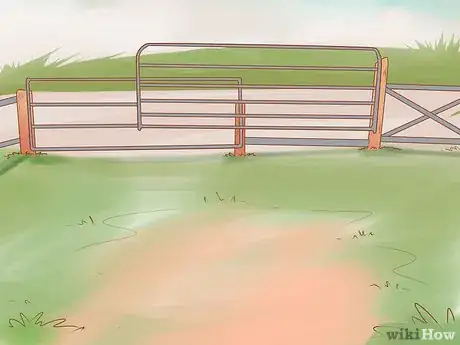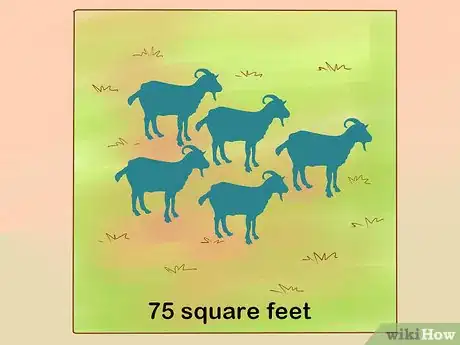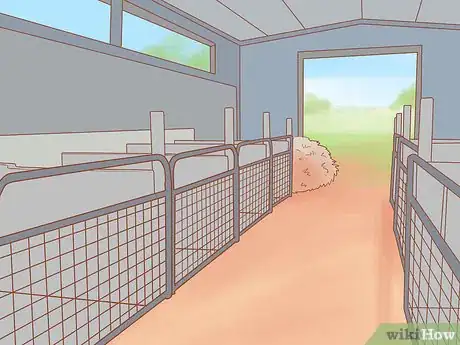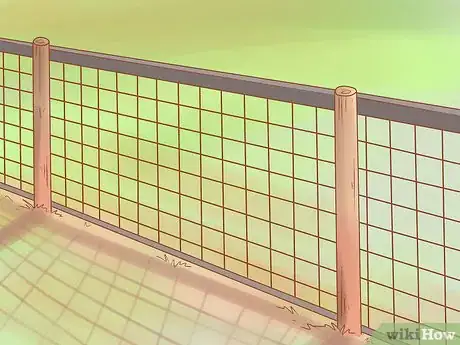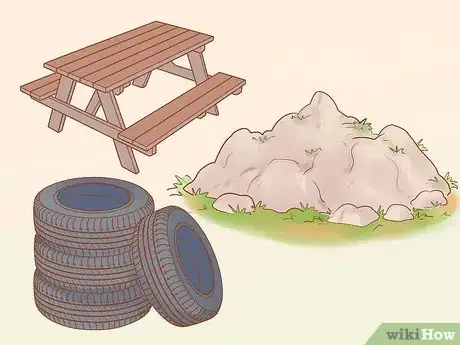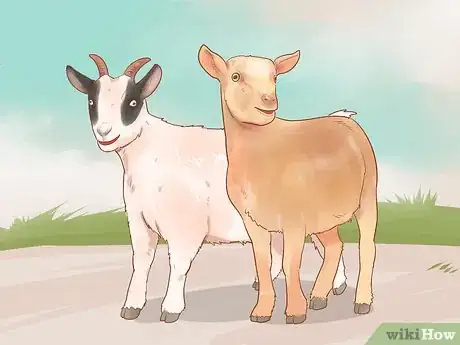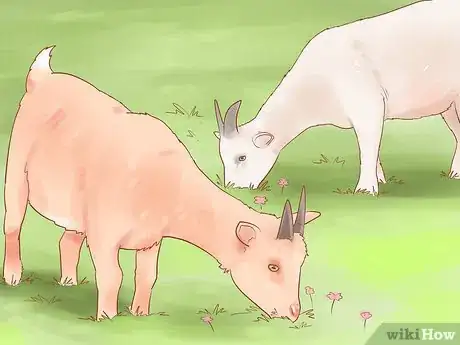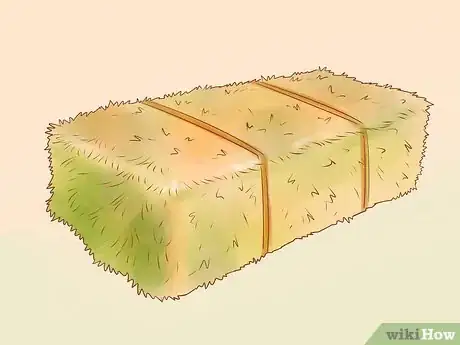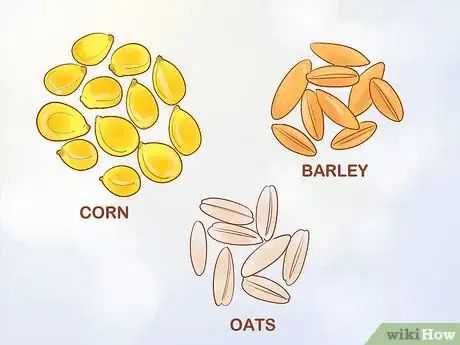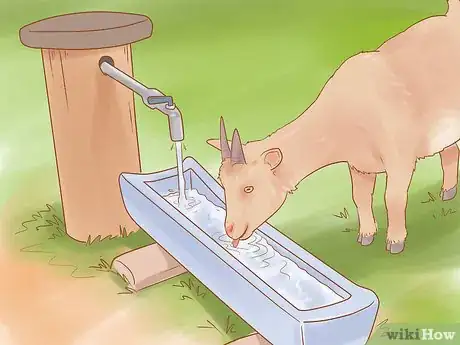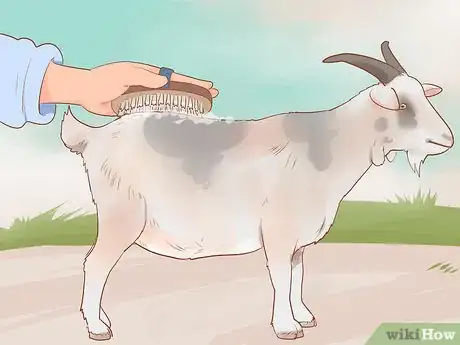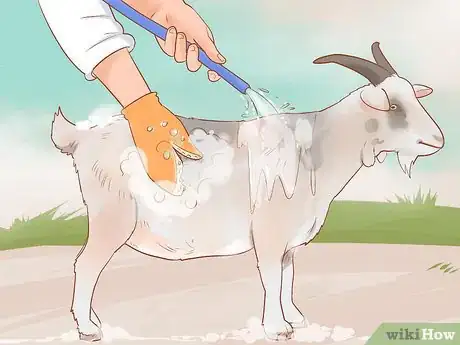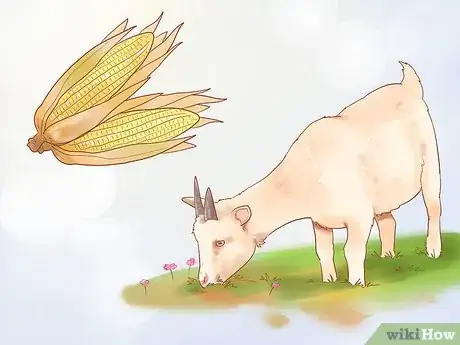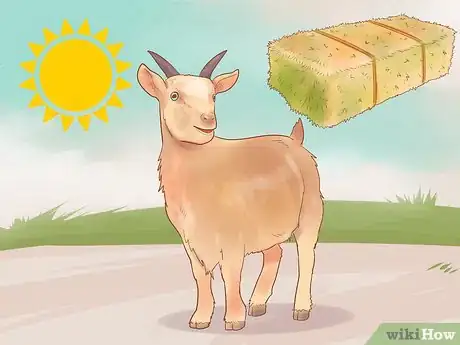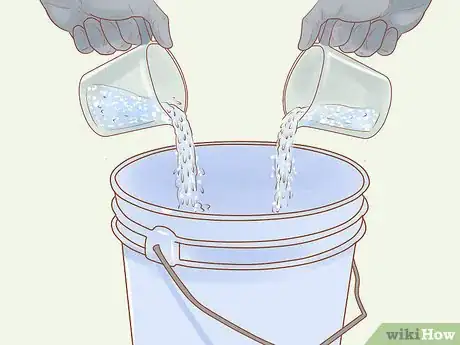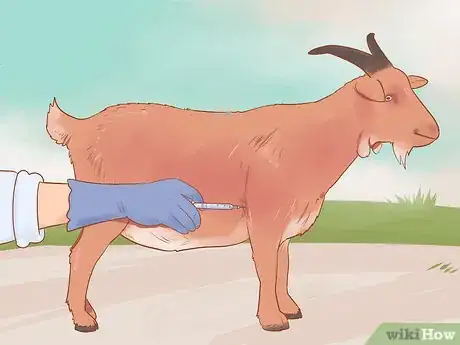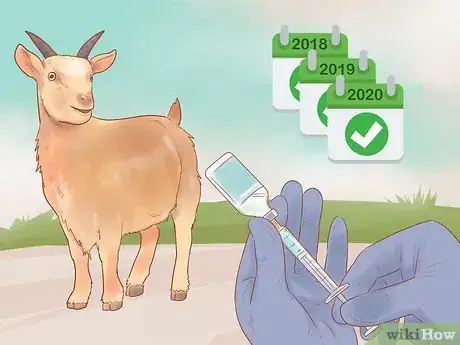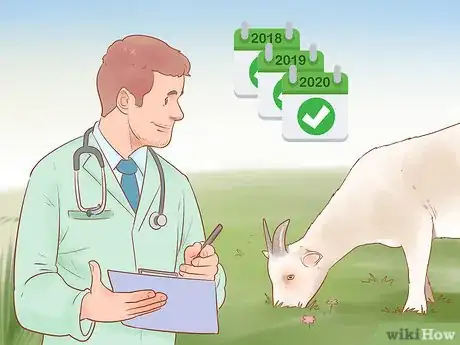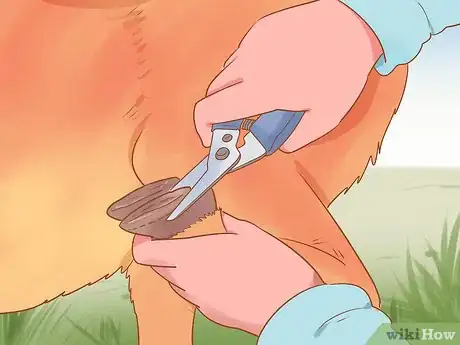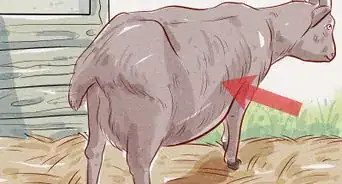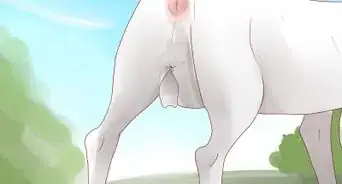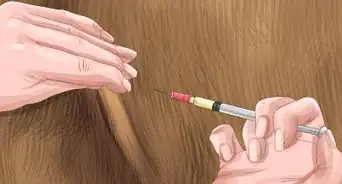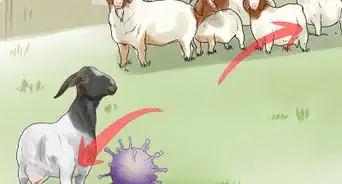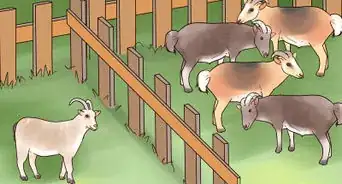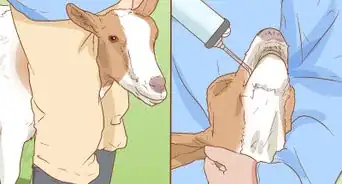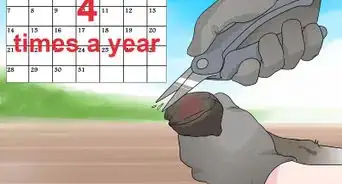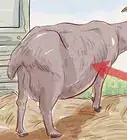This article was co-authored by Ryan Corrigan, LVT, VTS-EVN. Ryan Corrigan is a Licensed Veterinary Technician in California. She received her Bachelor of Science in Veterinary Technology from Purdue University in 2010. She is also a Member of the Academy of Equine Veterinary Nursing Technicians since 2011.
There are 13 references cited in this article, which can be found at the bottom of the page.
wikiHow marks an article as reader-approved once it receives enough positive feedback. This article received 35 testimonials and 91% of readers who voted found it helpful, earning it our reader-approved status.
This article has been viewed 845,235 times.
If you're looking for a backyard pet or an addition to your farmyard, pygmy goats are a good option. They do come with their own set of care requirements, but once you understand what they need, their care isn't difficult. In fact, they can thrive in most climates, as long as you create an adequate shelter. You also need to give them the proper food and look after their health to keep them with you for years to come.
Steps
Providing Shelter and Entertainment
-
1Determine how much shelter you need. To make this determination, consider the weather in your area. If you live in a mostly temperate climate, your goats may not need as substantial a shelter as other places. At bare minimum, you should provide a 3-sided structure that offers shelter from the sun and wind. However, if you're in an area that has severe winters, you'll need a full-on barn to protect your animals, though it can be a small one. You just need to provide protection from the elements.[1]
-
2Consider the size of your herd. The size of your shelter is determined by the size of your herd. In general, you need to provide 15 to 20 square feet for each goat you have.[2]
- So if you only have one goat, your shelter should be 15 to 20 square feet (1.4-1.9 sq. m). In practice, that's a 3-by-5-foot (0.9-by-1.5 m) shelter or a 4-by-5-foot (1.2-by-1.5 m) shelter. If you have 5 goats, you'll need 75 square feet (7 sq. m) to 100 square feet (9.3 sq. m), which translates to approximately an 8-by-9-foot (2.4-by-2.7 m) shelter or a 10-by-10-foot (3-by-3 m) shelter.
- In fact, you can use a large dog house for a pygmy goat if you are keeping it in your backyard.[3]
Advertisement -
3Create stalls. If you have multiple animals, create multiple stalls so each goat has his or her own space. The ideal floor for goats is gravel with clay on top of it. It's easy to clean out, and you can apply another layer every couple of years.[4]
-
4Install a fence. The best fencing for pygmy goats is wire fence. To keep your pygmy goats from jumping over, the fence needs to be at least 4 feet (1.2 m) high.[7]
-
5Include climbing areas. Goats love to climb, so you'll need to include some places for them to do so. For instance, any kind of picnic table is ideal for this pastime. You can even just create hills out of dirt, as goats will find that just as enjoyable. They also like to jump on and off these places.[8]
- Old tires also make good toys for your pets.
-
6Buy at least 2 goats. Goats are meant to be in a herd, so you should keep more than one. They prefer to live in a social group.[9]
Feeding the Correct Diet
-
1Allow your goat to graze. Goats can eat grass, brush, and forbs, though they will eat the last 2 over grasses. Forbs are weeds such as dandelions and clovers. In the summer, goats may be able to subsist solely on pasture if you have enough land.[10] You will need about 1/4 of an acre (1101.7 sq. m) of land per goat.[11]
- If you have a herd of goats, you will need several pastures to keep up with your goats' demand. Also, you want rotate where your goats feed so that plants have time to grow back.
-
2
-
3
-
4Provide a plentiful supply of water. Like all animals, goats need water to live.[16] However, water is especially important to goats, as they are ruminants, meaning it takes more water for them to process their food than other animals.[17] Always ensure they have access to clean, fresh water on a regular basis.
- Make sure to clean out the container you use fairly regularly and to change the water often.
Maintaining the Goats' Health
-
1Brush your goat once a day. Use a sturdier brush to get rid of the more obvious dirt on your goat. Next, use a soft brush (curry comb) to comb through your goat's hair. Also, feel for bumps on your goat as you brush, as those could indicate infections or a cut or scratch.[18]
- Your goat will not likely need clipping unless you plan to show her.[19]
-
2Bathe your goats only if they get parasites. Most of the time, brushing will be sufficient for your goat. To bathe the goat, slightly warm up the water so it's not cold. Lather the goat up with a shampoo meant for animals or specifically for goats. Use a washing mitt to help along the process. Rinse off the soap.[20]
- It makes it easier if your goat has a collar on because it is easier for you to hold on to her.[21]
-
3Provide vitamin A. Pygmy goats need vitamin A in their diets to keep up their health. Mostly, they can get this vitamin from green hay or from grazing. However, if you are not supplying either of these, try adding some corn to their diet.[22]
-
4Include vitamin D. Just like in humans, vitamin D helps goats absorb calcium, which maintains bone health. If your goats are outside most of the time, they will absorb vitamin D from the sun. However, if they don't get much sunlight, feed them either sun-cured hay (not heat-cured) or irradiated yeast.[23]
-
5Add minerals for pasture-fed goats. If your goats are exclusively pasture-fed (rather than alfalfa- and grain-fed), you should add a mix of iodized salt, limestone (ground), and animal bones (steamed and ground).[24]
- Essentially, you can put this mixture out in its own bucket and let the goats eat it as needed.[25]
-
6Inject selenium. Selenium is an essential nutrient, but it is especially important if white muscle disease is prevalent in your area, as selenium protects against this disease. When kids are born, you should provide a supplement of this nutrient by needle.[26]
- This disease calcifies the muscles, making them whitish, which is where the disease gets its name.[27]
-
7Give vaccinations yearly. Your goat will need to be vaccinated against enterotoxemia and tetanus, at the very least.[28] You can usually buy these at local feed stores and give them yourself. You may also want to ask your vet about rabies shots.[29]
- You may also want a clostridium CD vaccination.[30]
-
8Schedule a yearly checkup. To keep your goat in good health, it's best to schedule a yearly checkup. That way, you can ensure your goat has the proper vaccinations, and you know your goat is in good health.
-
9Trim your goats' hooves. Your goats hooves will grow over time, and if they aren't trimmed, you could end up with goats who can't walk well.[31]
- To trim them, use gloves, hoof shears, and a hoof knife.[32]
- Tie or hold the goat. You will need to have someone hold the goat in place while you trim its hooves.[33]
- Look for the growth rings. You should be able to see where the hooves have grown. Trim back the hooves until they are even with the last growth ring.[34]
Expert Q&A
-
QuestionHow do you know when they are pregnant?
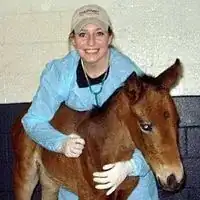 Ryan Corrigan, LVT, VTS-EVNRyan Corrigan is a Licensed Veterinary Technician in California. She received her Bachelor of Science in Veterinary Technology from Purdue University in 2010. She is also a Member of the Academy of Equine Veterinary Nursing Technicians since 2011.
Ryan Corrigan, LVT, VTS-EVNRyan Corrigan is a Licensed Veterinary Technician in California. She received her Bachelor of Science in Veterinary Technology from Purdue University in 2010. She is also a Member of the Academy of Equine Veterinary Nursing Technicians since 2011.
Licensed Veterinary Technician It can be hard to tell if your goat is pregnant or not due to how they carry their pregnancies. An ultrasound or xray is the best way to tell.
It can be hard to tell if your goat is pregnant or not due to how they carry their pregnancies. An ultrasound or xray is the best way to tell. -
QuestionDo female or male goats make better pets?
 Ryan Corrigan, LVT, VTS-EVNRyan Corrigan is a Licensed Veterinary Technician in California. She received her Bachelor of Science in Veterinary Technology from Purdue University in 2010. She is also a Member of the Academy of Equine Veterinary Nursing Technicians since 2011.
Ryan Corrigan, LVT, VTS-EVNRyan Corrigan is a Licensed Veterinary Technician in California. She received her Bachelor of Science in Veterinary Technology from Purdue University in 2010. She is also a Member of the Academy of Equine Veterinary Nursing Technicians since 2011.
Licensed Veterinary Technician In general, females tend to not smell as bad and be easier to manage than males.
In general, females tend to not smell as bad and be easier to manage than males. -
QuestionHow much money would getting goats, including fencing, shots, shelter, etc., cost?
 Ryan Corrigan, LVT, VTS-EVNRyan Corrigan is a Licensed Veterinary Technician in California. She received her Bachelor of Science in Veterinary Technology from Purdue University in 2010. She is also a Member of the Academy of Equine Veterinary Nursing Technicians since 2011.
Ryan Corrigan, LVT, VTS-EVNRyan Corrigan is a Licensed Veterinary Technician in California. She received her Bachelor of Science in Veterinary Technology from Purdue University in 2010. She is also a Member of the Academy of Equine Veterinary Nursing Technicians since 2011.
Licensed Veterinary Technician It depends on a lot of factors. It would probably cost somewhere between $500-$1000.
It depends on a lot of factors. It would probably cost somewhere between $500-$1000.
Warnings
- When you raise baby goats, you may decide you need to disbud them, which means remove their horns when they are young. Otherwise, you may get headbutted with horns when they are older. You can have them removed when they are 2 weeks old.[35]⧼thumbs_response⧽
References
- ↑ http://www.npga-pygmy.com/resources/husbandry/housing.asp
- ↑ http://www.npga-pygmy.com/resources/husbandry/housing.asp
- ↑ http://animals.mom.me/raise-pygmy-goats-5368.html
- ↑ http://www.npga-pygmy.com/resources/husbandry/housing.asp
- ↑ http://www.npga-pygmy.com/resources/husbandry/housing.asp
- ↑ http://www.npga-pygmy.com/resources/husbandry/housing.asp
- ↑ http://animals.mom.me/raise-pygmy-goats-5368.html
- ↑ http://animals.mom.me/raise-pygmy-goats-5368.html
- ↑ http://animals.mom.me/raise-pygmy-goats-5368.html
- ↑ http://www.goatworld.com/articles/nutrition/feedingpygmys.shtml
- ↑ http://animals.mom.me/pasture-requirements-pygmy-goats-3482.html
- ↑ http://nigerianpygmygoats.com/pygmygoats-care.html
- ↑ http://nigerianpygmygoats.com/pygmygoats-feeding.html
- ↑ http://www.goatworld.com/articles/nutrition/feedingpygmys.shtml
- ↑ http://www.goatworld.com/articles/nutrition/feedingpygmys.shtml
- ↑ http://www.goatworld.com/articles/nutrition/feedingpygmys.shtml
- ↑ http://nigerianpygmygoats.com/pygmygoats-feeding.html
- ↑ http://animals.mom.me/grooming-goat-2121.html
- ↑ http://animals.mom.me/grooming-goat-2121.html
- ↑ http://www.roysfarm.com/grooming-a-goat/
- ↑ http://www.roysfarm.com/grooming-a-goat/
- ↑ http://www.goatworld.com/articles/nutrition/feedingpygmys.shtml
- ↑ http://www.goatworld.com/articles/nutrition/feedingpygmys.shtml
- ↑ http://www.goatworld.com/articles/nutrition/feedingpygmys.shtml
- ↑ http://www.goatworld.com/articles/nutrition/feedingpygmys.shtml
- ↑ http://www.goatworld.com/articles/nutrition/feedingpygmys.shtml
- ↑ http://www.goatworld.com/articles/nutrition/feedingpygmys.shtml
- ↑ http://vetmed.tamu.edu/news/pet-talk/pet-pygmy-goats
- ↑ http://www.npga-pygmy.com/resources/health/vaccinations.asp
- ↑ http://nigerianpygmygoats.com/pygmygoats-care.html
- ↑ http://nigerianpygmygoats.com/pygmygoats-health.html
- ↑ http://www.goatworld.com/articles/feet/hooftrimming.shtml
- ↑ http://www.betterhensandgardens.com/goat-hoof-trimming/
- ↑ http://nigerianpygmygoats.com/pygmygoats-health.html
- ↑ http://animals.mom.me/raise-pygmy-goats-5368.html
About This Article
To care for pygmy goats, allow each goat to graze on about ¼ of an acre of land, including grass, brush, and forbs. If you don’t have enough pasture, feed each goat 1-2 pounds of alfalfa hay per day. When your goats aren't grazing, provide enough shelter to keep them out of the wind, excessive sun, and cold. This could be a simple 3-sided structure or a full barn, depending on your climate. Finally, make sure to provide your goats with things to climb on, such as tables, and toys, such as old tires. To learn how to groom your goat, keep reading!
